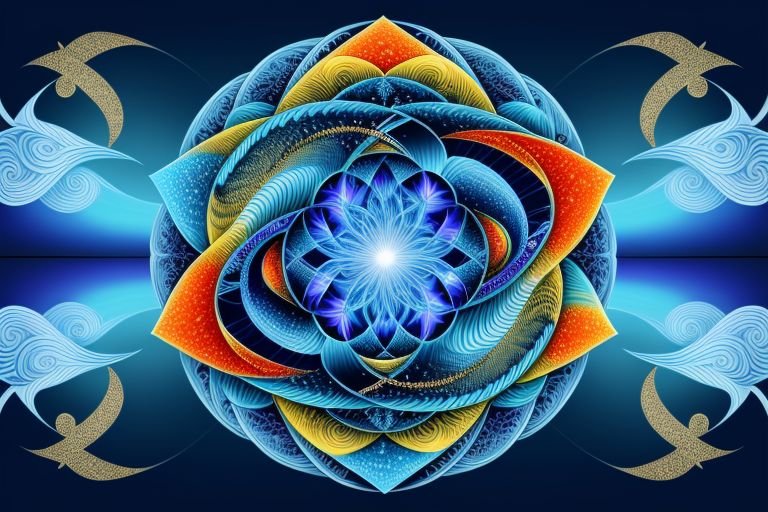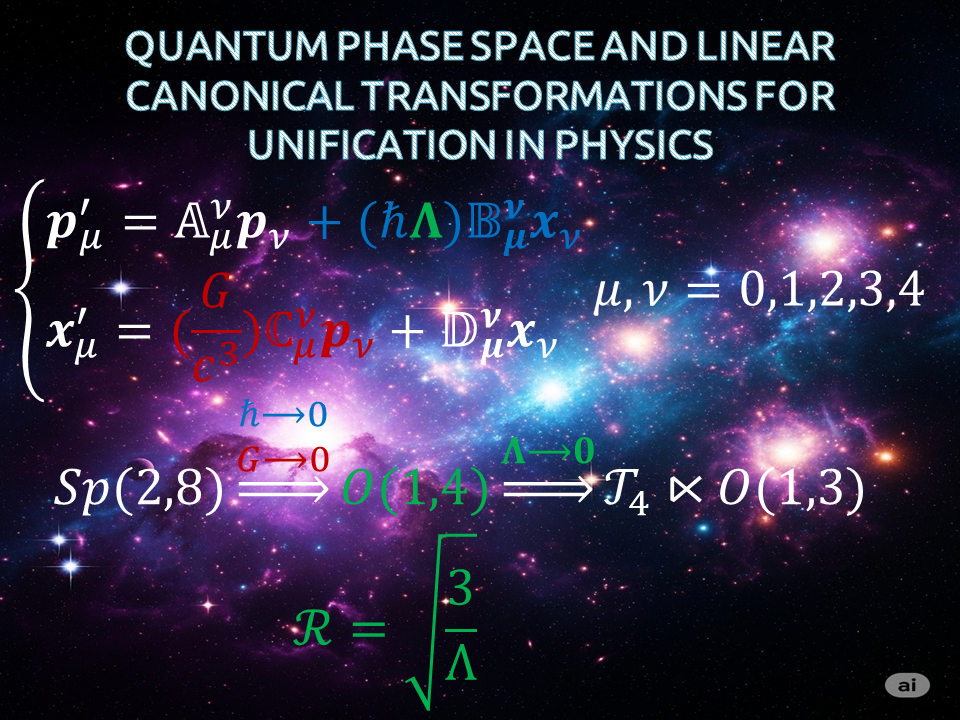
-
A Quantum phase space-based approach to unification
In my opinion, if the relationship of this quantum phase space with the canonical commutation relations and linear canonical transformations is considered directly, one may defines it directly as the set of momenta and coordinates operators that are related to each other by these linear canonical transformations (which leave the canonical commutation relations covariant.) According to the uncertainty relations, one cannot simultaneously have exact values for both momentum and position. Yet, the very definition of a classical phase space pre-supposes the opposite. In my opinion, therefore, the existence of negative probability densities reflects this problem that exists from the very definition of the classical phase space. I acknowledge that this approach, which uses these 'quasiprobabilities,' yields results... but it's probably not the best approach to maintain the classical definition for the phase space itself.
-
A Quantum phase space-based approach to unification
Hello everyone. This was seen on a Facebook group . Any comments/expertise are welcome. A Quantum phase space-based approach to unification The theory of relativity unifies space and time through the concept of spacetime, and changes of reference frames are described by Lorentz transformations, which "mix space and time." In this unification approach, energy-momentum is unified with spacetime through the concept of quantum phase space, and changes of reference frames are described with linear canonical transformations, which "mix energy-momentum and spacetime. " The concept of phase space originates from the Hamiltonian analytical formulation of classical mechanics. This concept has important applications, for instance, in statistical physics, but it is not compatible with the uncertainty relations of quantum physics. The search for a solution to this problem led to the introduction of the concept of Quantum Phase Space (QPS). A further challenge in introducing Quantum Phase Space (QPS) involves identifying its associated symmetry group. This group can be shown to be identifiable with the group of Linear Canonical Transformations (LCTs) which is isomorphic to a symplectic group. These LCTs are known in signal processing and optics as integral transforms that generalize fractional Fourier transforms. However, it can be demonstrated that they are equivalent to linear transformations that keep quantum canonical commutation relations covariant. Their relativistic and multidimensional generalizations can then be used to describe changes of reference frames in physics, thereby generalizing De Sitter, Poincaré, and Lorentz transformations, potentially incorporating quantum and gravitational effects. The illustrative picture shows that the “effects of the mixing between spacetime and energy-momentum"—considered to be potential quantum and gravitational effects—are linked to the extremely small values of the product of the Planck and cosmological constants, and the ratio of the gravitational constant to the speed of light cubed. Consequently, these effects might only be detectable at very large distances or with very high energies." It is also assumed that the approach corresponds to a spacetime whose vacuum is a De Sitter space with a (1,4) signature, which could be in agreement with a positive, non-zero cosmological constant. The mathematical formulations of physical theories rely on the concepts of space and symmetry groups. We can consider using the concept of QPS and its corresponding symmetry group, formed by LCTs, to better reformulate relativistic quantum physics. This reformulation could aid in the search for solutions to open problems in physics and cosmology, such as: quantum time operator, quantum measurement, unification of interactions, quantum gravity, neutrino oscillations and masses, matter-antimatter asymmetry, dark energy, and dark matter, etc. source : https://www.facebook.com/photo/?fbid=644632251991561&set=g.1790761467631151
-
Celestial holography
Hello everyone, I recently heard about the concept of "celestial holography". The sentence that first caught my attention with this notion is the following: "Celestial holography proposes that our universe can be understood as a projection on the night sky" (found in this link : https://www.pppl.gov/events/2024/colloquium-celestial-hologram-stargazing-quantum-gravity-and-back). I would therefore like to ask for more explanations (if anyone knows more) or simply opinions related to this concept and its possible applications and importance for physics. Thanks
-
Gap between life and non-life (split from What if god...)
It is clear that some large scale phenomena like geological processes and formation of stars cannot be reproduced in a relatively limited space and time and they are still occuring so there are some other ways to observe/study them more or less directly. Regarding the origin of life, it is unique in the sense that it is a key step in evolution around which there are still many important unresolved questions. I naturally wonder about a possible reproducibility in the laboratory or not; I think it's an obvious question to ask.
-
Gap between life and non-life (split from What if god...)
What do you mean? Anyway, perhaps there are misunderstandings, or perhaps I didn't express myself clearly, but to be clear: my previous statement concerns solely, at its level, the problem of the experimental observation of the abiogenesis process.
-
Gap between life and non-life (split from What if god...)
It seems to me that there are some misunderstandings in our discussion. So, I will simply rephrase my question differently : Do you think it would be possible to observe the abiogenesis process in a laboratory and within a reasonable timeframe?
-
Gap between life and non-life (split from What if god...)
As a reminder, I asked this question because another person previously mentioned a long duration to conclude that direct observation (possibly in laboratory) would probably not be possible due to this . Then you spoke about duration in relation to chemical kinetics when i asked why He/she said that. May be you don't understand what I mean by direct observation Or perhaps I expressed myself poorly. Anyway I mean by it " an experimental observation of the transition of a non-living system to a living system in a laboratory or something like that ". Otherwise, as far as I know, modern physics also has an experimental aspect of this kind.
-
Gap between life and non-life (split from What if god...)
I understand your explanations very well and they are not really new things for me. But let's say typically, has anyone ever given a realistic quantitative estimate of the duration of the chemical process that could correspond to abiogenesis?
-
Gap between life and non-life (split from What if god...)
I know a little about chemistry but without being a chemist. If you can go in-depth into the explanations I can follow and it would be appreciated. Thanks
-
Gap between life and non-life (split from What if god...)
However, as well-known, a living organism can be microscopic, even with a relatively low number of constituent molecules.
-
Gap between life and non-life (split from What if god...)
why do you say that ? I asked Why do you think a seemingly molecular process would take so long?
-
Gap between life and non-life (split from What if god...)
Why do you think an apparently molecular process would take so long? Indeed, if it were a process on a larger scale (stellar, geological, etc.), it would be more understandable if it required so much time.
-
Gap between life and non-life (split from What if god...)
That's correct, but I'm referring to a direct experimental observation of the phenomenon (possibly in a laboratory), of course. This process is also probably rarer than we might have thought, given the fact that the existence of extraterrestrial life eventually seems to be very difficult to confirm.
-
Gap between life and non-life (split from What if god...)
What I simply wanted to say is that, if I'm not mistaken, there hasn't been any direct evidence or direct observation of the process of abiogenesis, so it remains theoretical. This statement is unrelated to the hypothesis of the existence or non-existence of a god
-
Gap between life and non-life (split from What if god...)
Thank you for your comment and the links. However, I didn't really say that the understanding of the (theory of the) mechanism is not advanced enough... Rather, I asked if there has ever been any direct experimental evidence of the transition from "non-living" to "living"."In the absence of direct observation, even the most advanced theories remain debatable and hypothetical.

